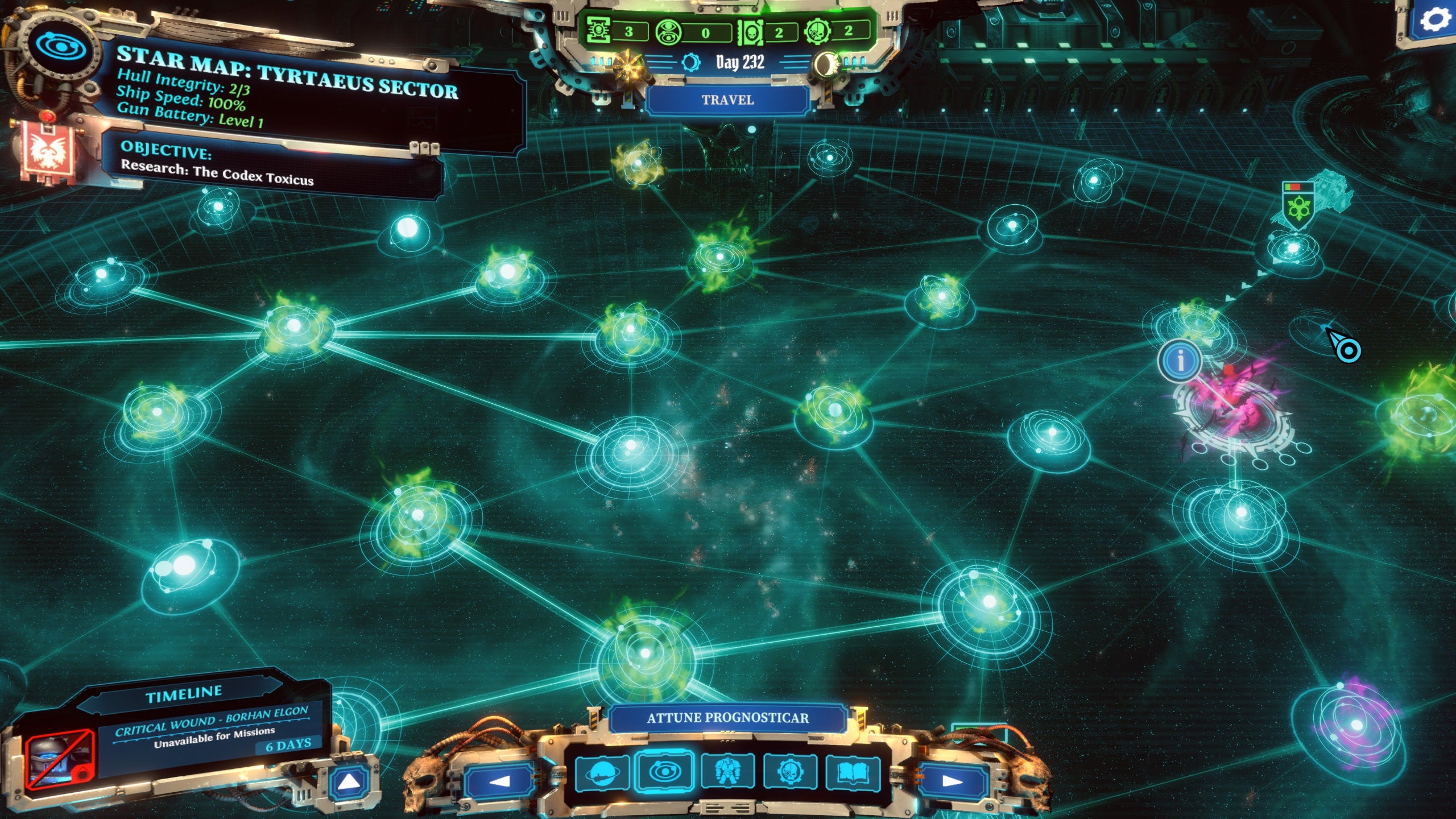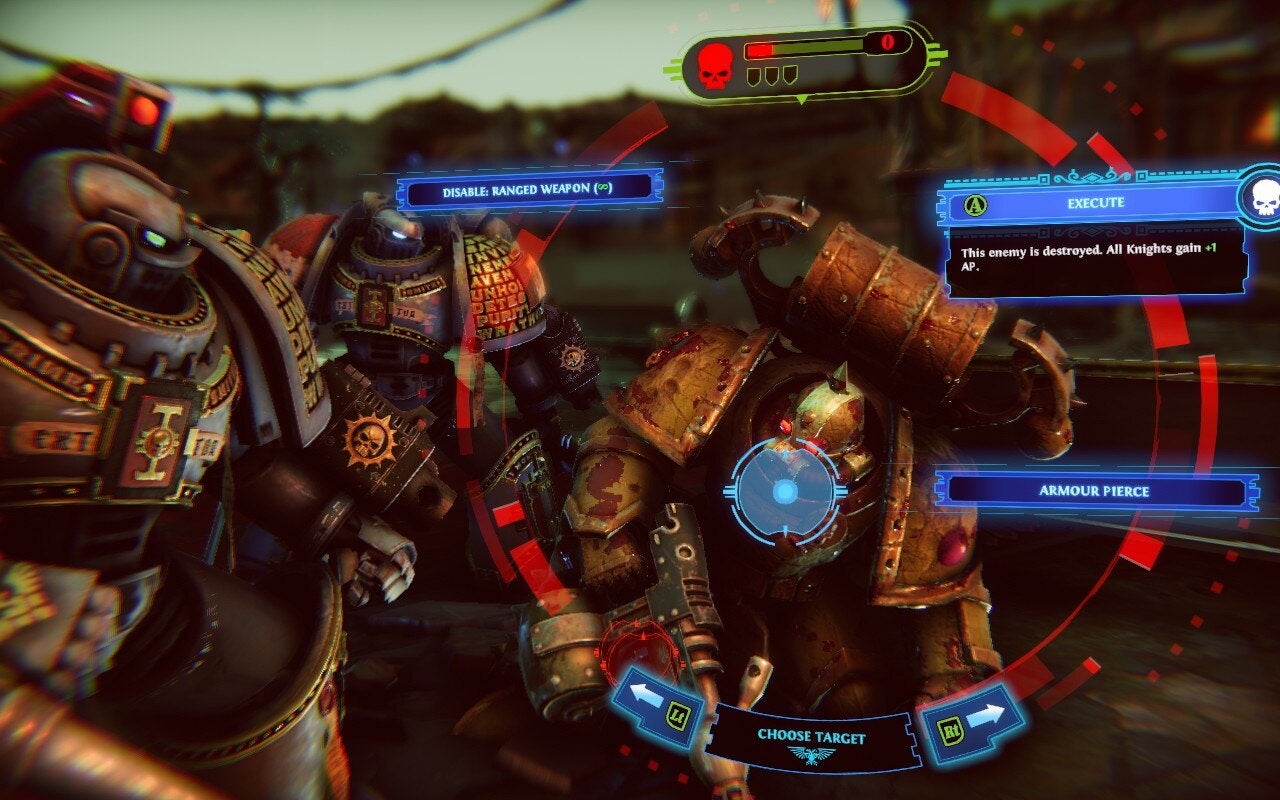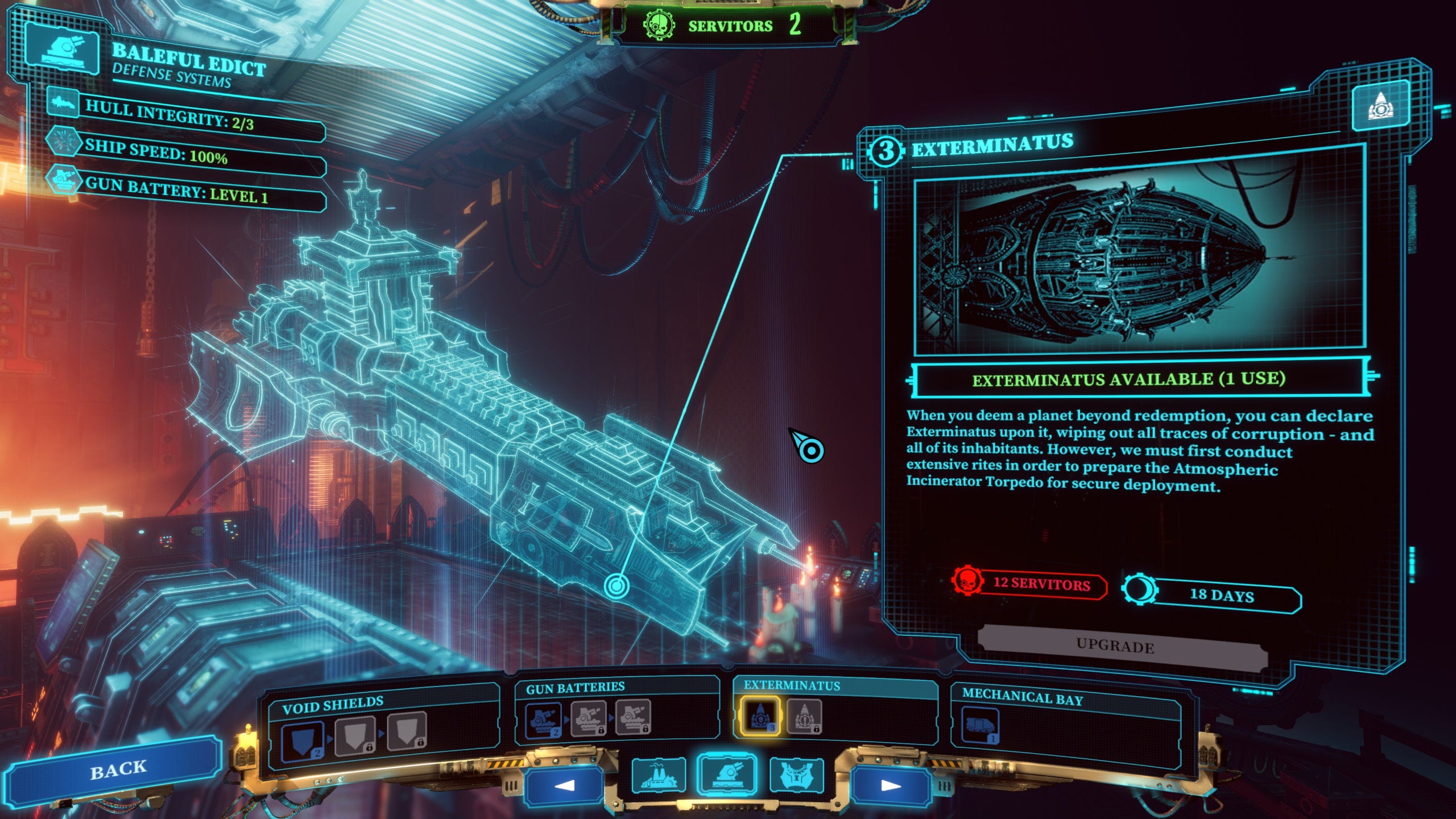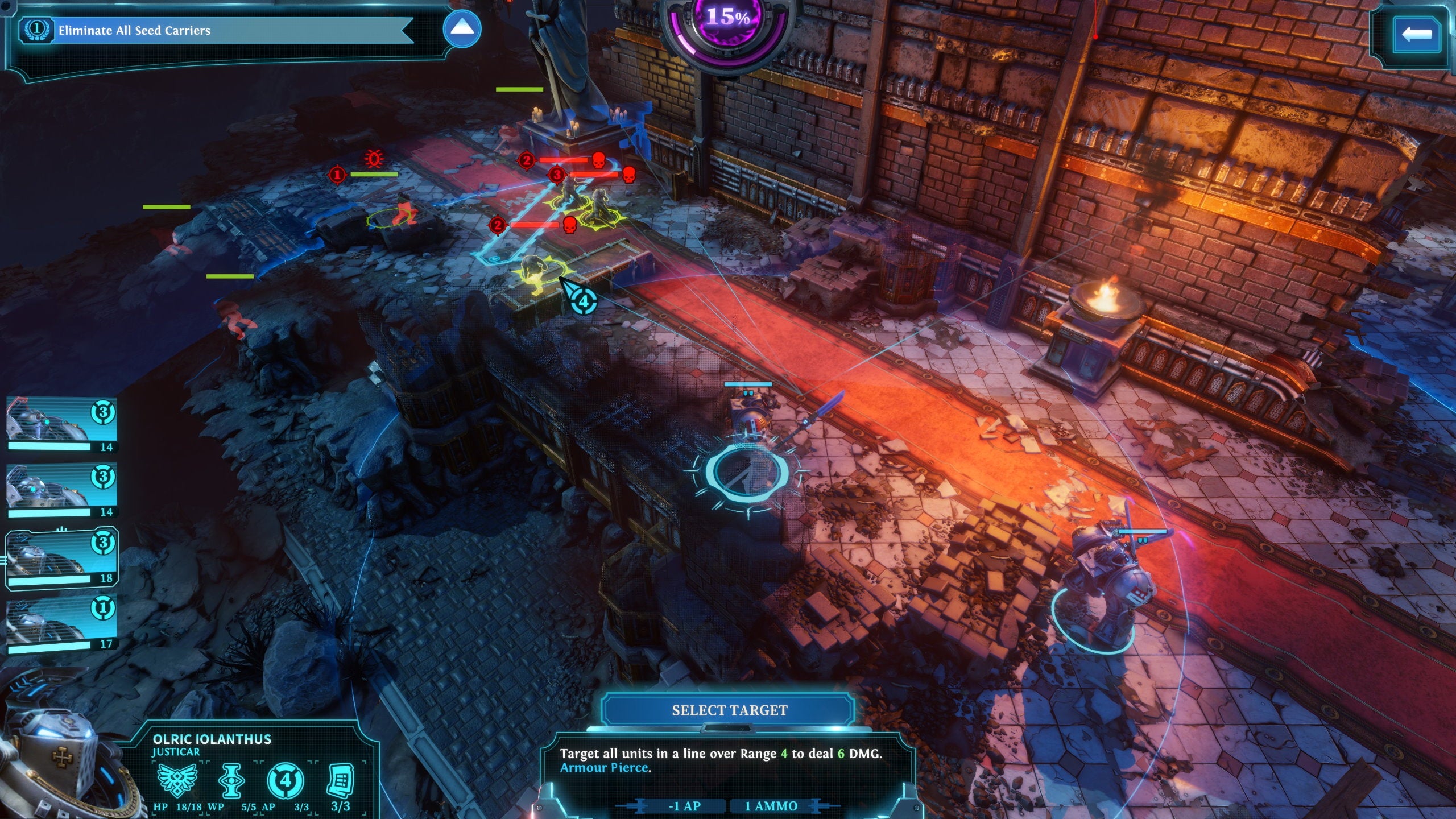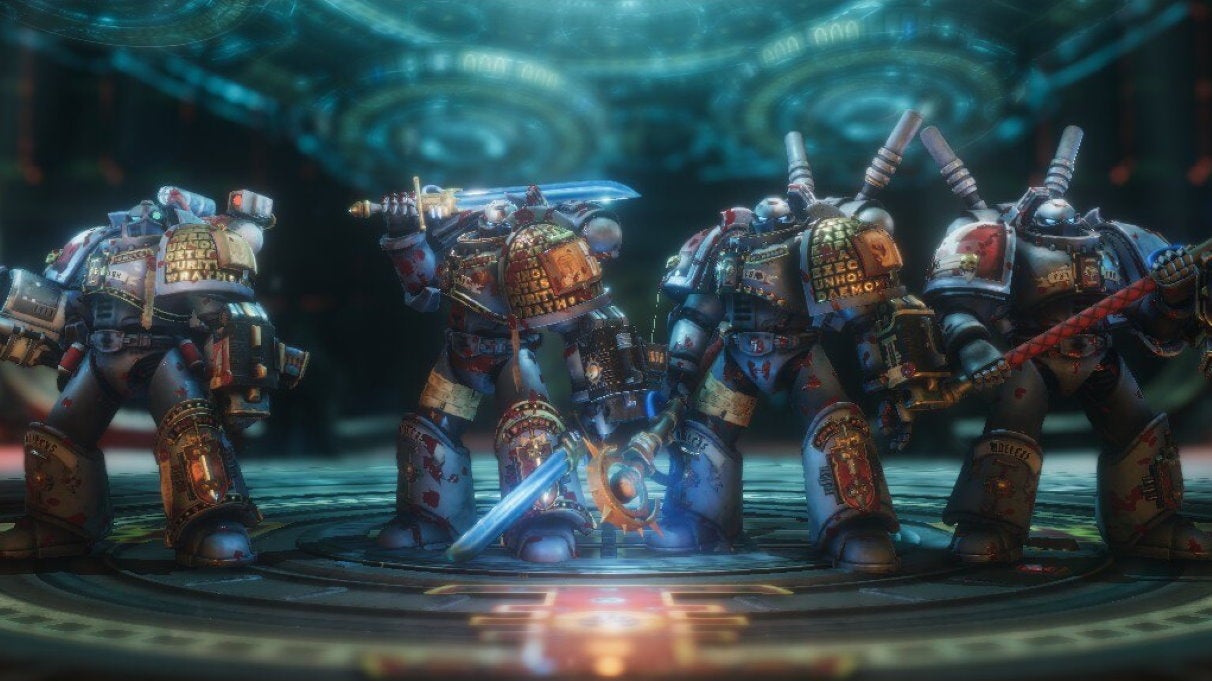Thankfully, the Grey Knights in Warhammer 40K: Chaos Gate - Daemonhunters are made of sterner stuff. I mean, just look at these brutes. They’re enormous. Even the Gears Of War lads would be jealous of the kind of muscle these big robo boys are packing, I’m telling you now. They’re by no means invincible, of course, but they can hold their own out of cover, and pick themselves back up again when your best laid plans inevitably start going down the drain. It may not be my most natural style of tactical manoeuvring, but man alive is it liberating. It’s a good thing, too, as the foes in this corner of the Warhammer 40Kverse are anything but a walk in the park. After encountering a strange plague unleashed by everyone’s favourite chaos god Nurgle, you and your fellow knights (aboard the wonderfully ornate Baleful Edict) must patrol the depths of space and purge the plague from existence. You’ll do this by fighting Nurgle’s diseased agents of chaos down on the ground in isometric turn-based battles, and by researching the seeds of this demonic plague back on your ship as you attempt to track this deadly ‘Bloom’ to its source and be rid of it once and for all. Now, I’m no Warhammerer, so much of its lore and character references have gone right over my head. Still, regardless of where you stand with either Warhammer or the dark, futuristic warfare of 40K, Chaos Gate - Daemonhunters is a compelling tactics game in its own right - and those early preview takeaways of “XCOM in space” do hit pretty close to the mark now that we’ve been let loose with final game. But Complex Games haven’t just put Firaxis’ colossal strategy epic up on a fancy gothic pedestal here. Instead, they’ve added their own thrilling adornments to it, encouraging players to not only attack enemies head on with their tough as nails Knights, but also to get up close and personal with their misshapen quarry, thanks to its combat system that puts just as much weight on devastating melee attacks as it does on ranged potshots from afar. Indeed, Chaos Gate - Daemonhunters leans hard on that first word of its subtitle. With missions spread out all across your doomed star system, you simply cannot be everywhere at once. As time moves on, planets will inevitably start slipping through the cracks, and you’ll need to choose where best to deploy your efforts. Completing a mission will halt the Bloom on that planet for a time, but the more you let somewhere fester, the harder those missions inevitably become. Combined with a progression system that prevents manual save reloading in the event of a mission going south, this really is a game that’s all about embracing the consequences of your actions and just rolling with it. You can restart missions from scratch if you’re really not pleased with how things are progressing, but that’s more or less it. There’s no going back to redo a turn, and definitely no going back in time to do a mission over if you fail it completely. I’m not gonna lie, part of me curses not being able to cheese my way to absolute perfection all the time, but if the likes of Deathloop and the wider roguelite genre have taught me anything in the last couple of years, it’s that being wedded to the quick load key isn’t always the best or most interesting way to play a game. Enter Chaos Gate with that mindset, and there’s plenty to admire here. It helps that the Grey Knights are so goddamn robust. If they fall in battle, they’ll recover in another three turns with half their original HP intact - or sooner, if you have an apothecary in tow. They each have their own level of Resilience, too, which dictates how many of these ‘critical wounds’ they can sustain before it’s well and truly curtains. As a result, I’ve yet to lose an entire knight so far, although I’m getting perilously close on a couple of my favourites. After battle, those with critical and light wounds will need some time to recover before they’re ‘battle ready’ again (you can send them back out if you want, albeit with less health than if they were fully rested), but as in XCOM, there are various replenish your ranks if you’re low on fit and healthy battle mates. Requisition points can be earned to recruit more knights to your ranks from high command, and you can bolster your barracks to make room for more of them by putting resources into your tech priest’s construction tree - although with so many other parts of The Baleful Edict in need of repair, you’ll need to prioritise exactly what you need with the time available to you. Still, it’s that knightly endurance that makes battles so much more exciting than those I remember from XCOM. Instead of bracing myself for the pain to come, I’m raring to see the next gory takedown, whether that’s a regular blaster gun round searing a poor bloke in two, or chopping off entire limbs with one of my knight’s special precision attacks when landing a critical hit. For the first time in goodness knows how long, the word ‘critical’ actually means something here, as performing one successfully will take you into its Precision Targeting menu. Making the most of these is hugely important in Chaos Gate - Daemonhunters. Not only are critical hits one of the only ways of extracting those all-important seeds to further your research (and the wider story), but you can also use them to disable enemy weapons, stun them, or (my favourite), execute them completely, earning all your knights another action point, potentially giving you a crucial leg up in battle when times are tough. As any seasoned tactician will know, action points are the lifeblood of your party. Movement and attacks are drawn from the same pool in Chaos Gate - Daemonhunters, although here you’ll also have to balance your knights’ Willpower points if you want to charge up certain attacks or use special abilities. Such power does come at an additional cost, however. Your Willpower bar is one thing, but in each level you’re also fighting against another ticking time bomb: the Warp Surge. This corruption meter increases every turn, and the frequency with which you exert your Willpower, plus the planet’s overall corruption level, will affect how quickly it climbs to 100%. When a Warp Surge does occur, enemies will receive additional mutations, making battles progressively harder for a set number of turns. These range from the positively knuckle-biting +5 armour to all enemies for a turn, (a truly despicable kind of punishment), to wider party debuffs that slow your movement speed or take away a Willpower point for the remainder of the battle, for example. You never know what you’re going to get, and the way it all feeds off your own desire to get things done quickly means you’ve got to be constantly on your toes, ready to adapt to whatever roll of the dice the chaos gods throw out next. This alone gives Chaos Gate a hair-raising change of pace compared to its lauded source material, but the Knights themselves make for a heady power fantasy as well. Their ability to absorb and take hits gives them so much more flexibility than XCOM’s puny humans, and the industrial playgrounds Complex Games have constructed only serve to highlight their superior battle skills. Cover isn’t always a guarantee here, you see, and sometimes the best way to flush out enemies is to remove it altogether, either by chucking one of your grenades or aiming your gun at one of the many destructible (and often explosive) parts of the environment. At one point, I even chucked a sewer grate at a massive plague tree like a giant metal frisbee, an act that proved to be the decisive blow in an otherwise long and hard-fought battle. That’s just the start of it, too. With shields on hand to protect from incoming fire, as well as teleports, rams, support fire, counters, and the ability to transfer armour, action points and more to other Knights, there’s a surprising amount of depth to be found in its four main character classes, and it all adds up to make these walking talking shoulder pads a force to be reckoned with. The decision to ditch XCOM’s pesky hit percentage is key to this as well. At preview, Matt was worried this knowledge would rob fights of their moment-to-moment drama, but for me at least, the thrill is every bit as powerful. Knowing what will and won’t hit in advance means you can deploy your soldiers much more effectively in the heat of battle, and some of my most memorable moments so far have all been born from making those collective, calculated decisions. I may not be holding my breath every time I take a shot, but the rush of completing a mission by the skin of my teeth, or suddenly having to hold out two more turns before being teleported the heck out of there, has still resulted in plenty of elevated heartbeats and sighs of relief. To close, I will leave you with this. At the climax of Chaos Gate’s first act, you’re tasked with protecting one of your crew in an enclosed, sunken chamber while enemies pour in from all sides up above. After dispatching a tricksy boss who split himself into three clones every time you hit him, I was barely holding on. My Knights were scattered, penned in by enemy overwatch cones, and my crewmate unprotected. Everyone was getting (war)hammered, but all I had to do was hold out for two more turns. Thinning out the crowds wasn’t an option. Their armour levels were too high, and many were too far away to do any significant damage. I needed to get back to my crewmate, but as I said right at the start of this review, breaking out of cover and leaving my soldiers exposed goes against every single fibre of my being. In the end, though, it was the only option left. I was convinced I’d fail, that if I was suddenly asked to hold out any longer (as missions often do), then I’d be done for. But I healed up as best I could, and used every last action point to manoeuvre my Knights round into a human shield, bracing for defeat as I watched my foes get into position and play their last turn. I winced as one Knight fell to his knees, but the others held firm, and let me tell you, victory had never tasted so sweet. It may not have been the most perfect win, but hot damn, it sure felt good. So embrace the chaos, friends, because Daemonhunters is the absolute business.
